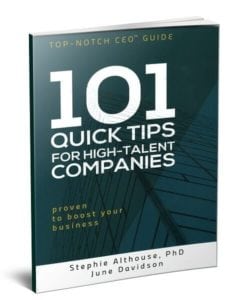Increasing Profits, Making an Impact, Enjoying Work-Life Balance:
Do we have to pick one?

Does transforming the talent of top experts (who we lovingly call "geeks") "only" include increasing money (an obvious aspect of wealth)?
Most of the geeks we know and work with would say resoundingly "No." They also want to make a difference with their work; create an impact.
When we say "Transforming Talent into Wealth" what exactly do we mean?
Robert Donnell from P5Marketing asked our founder, Dr. Stephie, for a second interview. He asked her to explain a bit more about these questions:
- What really is wealth?
- If we want more money, more success, more impact with our work, do we have to give up everything else?
- For example, do we have to give up the idea to have a sense of work-life balance? Do we have to sacrifice begin there for and with our family?
Dr. Stephie, being a geek and women in STEM (sciences, technology, engineering, and math) herself, has unique perspectives and experiences on this subject.
Here is the podcast as well as the transcription of it. Enjoy! And please follow us on LinkedIn and Facebook and contribute your experiences to this conversation. Thank you!
Here is the interview (podcast):
Want to read the interview? Great! Here it is:
Robert: Hi. This is Robert Donnell with P5 Marketing. This is part of our ongoing series of conversations with extraordinary people who are making a difference, people whose voices we should be listening to. My guest today is Dr. Stephie Althouse from Top-Notch CEO. She's a returning guest with us. Hi, Dr. Stephie.
Dr. Stephie: Hi.
Robert: I thank you for coming back because, during our last discussion, we ended on the concept of wealth, and wealth being a three-legged stool. A lot of people had questions about that because everybody seemed to jump to money and that this was all about money. Maybe you could tell us a little bit more about wealth and, really, your definition of wealth, and how it can impact all of us.
Dr. Stephie: Great. Well, thank you for having me back.
At Top-Notch CEO, our tagline is, "Transforming your Talent into Wealth." Wealth is a three-legged stool. One leg, if you imagine a three-legged stool, is money. If you're an employee, it's income, bonuses, perks, whatever they give you. If you're a business owner, we're talking about revenue and profits. The second leg is about making a difference. The people we work with, they're top-skilled. They have the potential to really make a difference to their customers, to their society, perhaps even to the whole world with their technology, or their wisdom, their skill set, etc. We want to transform their talent into really making that difference, and whatever is standing in the way, we want to get that out of the way. The third factor is about creating a quality of life that you love. If you cut off any one of those legs, then I submit, you're falling on your butt. You don't have true wealth.
Robert: That's true. I was just going through the visual of me falling off my two-legged stool. That obviously ties to your notion of work-life balance. Let's say corporations, companies, bosses, how do they address the concept of work-life balance in, if you will, the necessary pursuit of profit?
Dr. Stephie: Well, thank you for asking this really excellent question. When you look at high-tech companies, for example, this is where a lot of our geeks who we work with hang out. It's not the only area, but that's one of the areas. Then you'll see that people who work there often report it's a challenging and fun environment to be in on one hand, and it's also high-demand, and it's fast-paced. There are some big companies that constantly query their employees and ask, "How do you like working here, etc.?" They [often] get a lot of high marks, except for work-life balance. People leave after two, three years. It's not uncommon because they're burned out. This is also, of course, something that particularly comes into the conversation when we're talking about women in STEM [STEM = Science, Technology, Engineering, and Math], because they, even more so than men, have that query, "How can I be a great mom and a great woman in STEM creating a career that is to my liking?"
Dr. Stephie: Well, thank you for asking this really excellent question. When you look at high-tech companies, for example, this is where a lot of our geeks who we work with hang out. It's not the only area, but that's one of the areas. Then you'll see that people who work there often report it's a challenging and fun environment to be in on one hand, and it's also high-demand, and it's fast-paced. There are some big companies that constantly query their employees and ask, "How do you like working here, etc.?" They [often] get a lot of high marks, except for work-life balance. People leave after two, three years. It's not uncommon because they're burned out. This is also, of course, something that particularly comes into the conversation when we're talking about women in STEM [STEM = Science, Technology, Engineering, and Math], because they, even more so than men, have that query, "How can I be a great mom and a great woman in STEM creating a career that is to my liking?"
The key thing here that I want to get across is that many actions that lead to more profit can also lead to more work-life balance. In other words, they don't have to be at odds with each other, which I think is a myth that I'm ready to kill right now.
For example, if we're just going through an example list of actions you could take that lead to more profit but also can lead to more work-life balance, one is effective team building and delegating. That, by the way, is true both at work and at home. You don't have to do everything yourself, and you should not. There are ways to do this well, and there are ways to do this not nearly so well.
Also, not every task is created equal in the sense of having the same sort of result. So, the 80/20 rule, or the Pareto rule, is very, very powerful. That means, for example, not every client is equally valuable to your business. Not every task that you could think of doing is equally valuable. We all know that, but do we do it? How systematically do we go about determining how important something is?
Batching your tasks rather than doing them in little dribbles and drabs, for example, even reading [and responding to] email, being on the phone, and things like this, but many other items as well. It's a good thing that Automated Mailing Services are now available to help with these kinds of tasks.
There's the Parkinson's law which says that, basically, however much time you give to a particular task, you will almost be guaranteed to use it up - unless you have that distinction about Parkinson's law. That can be a huge time saver. The point is that all of these things don't cause you to work harder, but smarter.
Another part is systematization. If you systematize as much as possible - those things that are done in your business - it's like establishing a track. If you think of your company as a train, you don't want to reinvent the tracks every time. You want to establish tracks for the train to run on over and over. That makes a lot of things possible that otherwise are impossible. Effective succession planning, for example. Key people taking a vacation without worrying so much about things not being handled correctly in their absence, and then they have to work despite the fact that they are on vacation. That leads to burnout, too. Maternity leave [also] becomes easier.
With all of that, the company's not better off only in the short term, but this process really leads to sustainable growth, and it becomes possible to create a long-term legacy. By the way, if you ever want to sell a company, it's sold way more easily than it would be otherwise after you have done the systematization and established those tracks. Otherwise, the company may not be worth much.
Robert: Right.
A Well-Working Structure for Accountability, A Good Method for Feedback, and Thinking Thinkingg Things Through...
Dr. Stephie: Those are some examples. Then there are others, for example, a well-working structure for accountability, a good method for getting feedback, and thinking things through because our thoughts tend to loop in our head. Especially, if you're a top executive, sometimes you may not have that many people to talk to. There's this good old saying, "It's lonely at the top." You may not want to talk to someone who's in your same organization and tell them that you have some trepidations about something, you're not sure about something, or you need to think something through. It's often very valuable to have an external person who is savvy in your “geeky” business. In other words, he/she speaks your language, and is also skilled in helping you to think things through and not just giving you a bunch of advice ... that doesn't help you to get in touch with what's inside of you already, your inner wisdom if you will.
Robert: This is fascinating, I mean if you think about it. What I love about everything that you have on that list is that, as a business owner, I can see the very clear benefit to the corporation. Obviously, you do those things, you're going to make more money. I mean, your top line is going to be improved, and your bottom line is going to be improved. I'm fascinated by the side benefit. Well, maybe not the side benefit, but the additional benefit that this leads to better work-life balance for their employees, which then has another improvement to profitability and the strength of the company. Do you agree with that, obviously? I mean, tell me more, if you would.
Very Clear Benefit to the Corporation: Owners, CEOs, Executives with Profit and Loss Responsibility. Obviously, You Do Those Things, You're Going to Make More Money.
Dr. Stephie: Yeah. Absolutely. A lot of times, people are very focused on money. Especially if you're thinking about hiring, let's say, a coach, or an interim executive service or a trainer for improving things in your company, usually you think about improving your bottom line first. Sometimes you may be aware, "Okay, we have really bad work-life balance scores from our employees, and we need to do something about this. We have talent that we can barely replace, and they leave in droves, and we want to do something about this," or, "We're committed to having more women in top leadership, and we don't quite know how to deal with continuity in leadership through maternity leave and things of that nature."
There's a Reason We Describe Wealth as a Stool...
Very often, people come to the wealth stool from the money leg, but what they're finding out is that ... actually, in fairness, a lot of times the geeks we work with, actually, come at it from the impact leg first, even before the money. What they're finding, though, is that there's a reason this whole thing is a stool and, therefore, completely connected because one aspect influences the other. There are extremely clear benefits for both the business owner and the CEO, as well as all the other executives who are responsible for the profit and loss, the bottom line of the company. Because, as I said, as you work on the things you need to work on to increase profits, you automatically improve impact, and you automatically have the opportunity to increase the quality of life of the people who are involved, at all levels of the team.
Very Clear Benefits for Employee Owners Because They're an Owner, too. That's Assuming That The Employee Ownership is Actually Practiced.
By the way, there are also very clear benefits for employee owners because they're an owner, too. That's assuming, of course, that the employee ownership in the company we're talking about is actually practiced, and that the employees understand what it is. They have to be invited to actually participate as an owner, give input, take initiative, etc., rather than just having a piece of paper that says they're an owner.
Robert: I think your obvious affection for employee ownership makes sense, but it also is one of the rules, if you will, that you'd like to give to anybody who's ambitious and wants to succeed in the company, and that's to think like a CEO. Can you expound a little bit on that?
This is True for Any Geek: If You Think Like a Top-Notch CEO or an Owner, Your Chances to Increase Your Opportunities Go Up Massively.
Dr. Stephie: Yes. Absolutely. I was about to say it's clear that the people who own the company or who are at the very top and lead a company, that they benefit from this wealth stool. Well, what about all the other people? What about a "regular but ambitious" employee? Let's say, a woman in STEM is working her way up the career ladder ... or any other kind of “geek” in whatever discipline. It doesn't have to be science or technology or engineering, and it doesn't have to be female. It could be male. Either way. If you think like a top-notch CEO or an owner, your chances to increase your opportunities go up massively. That's on all three prongs of it, on the income, promotions, stock, stock options, bonuses, all that, that's on the money side of the wealth stool.
The impact of your work and the satisfaction that you can derive from that [go up as well]. You could have gone into an easier field. You didn't have to pick up something this geeky. Chances are, you do it because you love it. You do it because you're good at it. You also do it because you want to feel satisfaction from your work. That's at least the people we work with.
Then the third part is you have proven yourself such that you can more than likely carve out more freedom for yourself than is normally the case. By the way, if you think like a top-notch CEO and your company that you're with right now doesn't appreciate that, then I'd say go somewhere else because you will be a coveted asset for any innovative company that sees their people as the most valuable asset.
This Applies to HR Professionals, Too. Chances Are High You Will be Rewarded for Your Top-Notch Mindset.
That applies to HR professionals, too. If you, as an HR professional, look at your job from the mindset of a top-notch CEO, that's a much bigger view of your job than is often the case for HR professionals, I would say. If the business does better, and you helped it to get there, that's good for you. That's, in fact, great for you because if the company you work for elects not to reward that, again, you'll be a coveted addition to another team elsewhere. Chances are, though, you will be rewarded for your unusually awesome, namely top-notch, mindset.
This is all about thinking about how your actions affect the big picture. Usually, employees moving up the ladder, and even HR professionals, don't have that systematic training, and that's part of what we do.
Robert: Well, that's some serious food for thought. We've got just about a minute left, so I thought I'd ask if you had some wisdom to share on the way out the door. I think next week we can talk about how to put all this into action. You have a powerful tool you want to share.
Dr. Stephie: Yes. We have a tool that's called purpose mapping or purpose quadrants. It's really a tool to help you create what we call “dynamic work-life harmony.” It's not static. There are some people, even some very famous women, who lately have said work-life balance is dead and that it's static. Well, let's talk about that and come up with a better understanding of it.
Robert: Thank you! Talk to you next time.
Dr. Stephie: Thank you for having me on.
To order Dr. Stephie's book 101 Quick Tips for High-Talent Companies (and people!) click on the image of the book.

